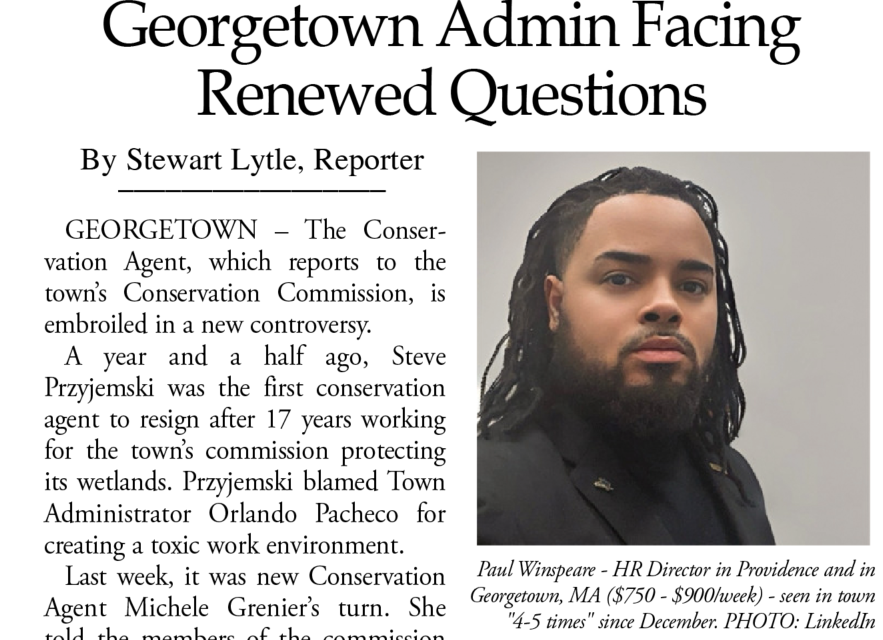By Stewart Lytle, Reporter
GEORGETOWN – The Conservation Agent, which reports to the town’s Conservation Commission, is embroiled in a new controversy.
A year and a half ago, Steve Przyjemski was the first conservation agent to resign after 17 years working for the town’s commission protecting its wetlands. Przyjemski blamed Town Administrator Orlando Pacheco for creating a toxic work environment.
Last week, it was new Conservation Agent Michele Grenier’s turn. She told the members of the commission (ConComm) that she was being mistreated by Pacheco because he was trying to cut her contract hours from 32 a week to 24.
Grenier, who was a Select person for Middleboro for 10 years and has college degrees in municipal management and human resources, told the ConComm members, “The town is treating me unfairly.”
She was hired in November by former ConComm chair Carl Shreder with an employment letter that Pacheco signed. The contract was for Grenier to work for the town for 32 hours and $65,000, not 25 and $54,000 a year.
Pacheco wrote, “8 of the 32 will be allocated to the town of Essex who will reimburse the town for those hours. All salary and benefits will be paid by the Town of Georgetown.”
After a few months as conservation agent for Essex, that town said it did not have the $312 a week it was reimbursing Georgetown for her work on Tuesdays.
Pacheco wrote: “The Town of Georgetown did not cut her hours. As you know the position was shared with Essex and the town of Essex has decided the regional agreement was not in their best interest She is still budgeted the 24 hours for Georgetown which is what she was hired for,” he wrote.
At the same time, the town’s human resources director, Paul Winspeare, who conducted an investigation into Grenier, works full-time at the city of Providence, RI, plus a few hours at the Georgetown Town Hall, about 100 miles apart.
WPRI, TV-12, which serves Rhode Island and southeastern Massachusetts, reported recently that Winspeare is under review for working for Providence and Georgetown, plus heading a consulting firm.
Pacheco defended his decision to hire Winspeare, writing, “I do not think this is an unusual situation as many employees have other jobs but they are not allowed to work hours in 2 places at the same time.”
Winspeare was approved unanimously last December by the SelectBoard even after it was disclosed that he worked for Providence full time as well as Georgetown. After the initial news reports, former chair Amy Smith asked Pacheco to review Winspeare’s dual positions.
Several residents have contacted the Town Common questioning the dual positions.
“I did speak with Providence officials and did explain much of his role was remote and that he had only been in Georgetown on a limited number of occasions,” Pacheco wrote to the Town Common.
When the Town Common asked about Winspeare’s dual employment, Pacheco wrote: “I do find the timing of your reporting somewhat concerning as the interest seems to be not that he also worked for the City of Providence, which was well known and disclosed from day 1 when he applied and subsequently unanimously approved by the Selectboard, but that his independent investigation found wrongdoing by an employee within the department you seem to have a particular fondness for.”
Winespeare’s investigation of Grenier accuses her of violating the Massachusetts Open Meeting Law and a code of ethics, based on complaints filed by a disgruntled resident who was not approved by the SelectBoard as a member of the ConComm.
Pacheco told GoLocal News in Providence that he hired Winspeare to work 10 to 12 hours per week, at a rate of $75 per hour. He said Winspeare is not directly interacting with employees, and that he had personally only seen him in the building “four or five times” total since December.
Winspeare met with Grenier to conduct an investigation of her. His investigation regarding Grenier proposed that she and all members of the commission be forced to submit to training about Open Law Meetings.
Grenier has apologized for writing a letter recommending that one candidate would be more qualified than another candidate. She said she wrote the letter as a personal issue, not as a town employee.




